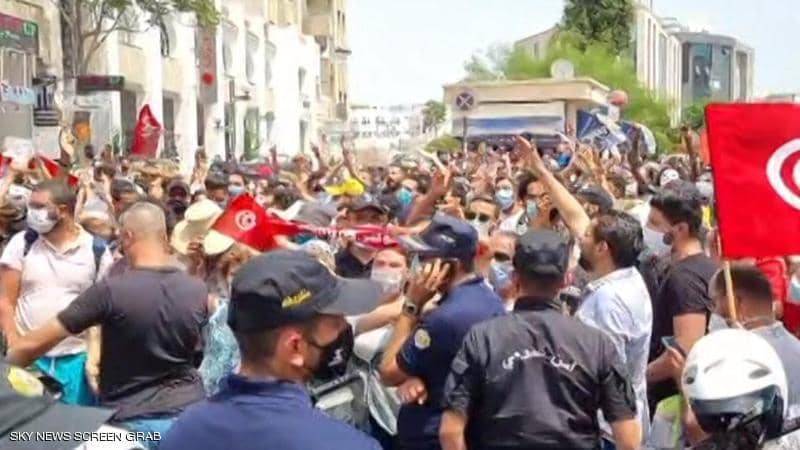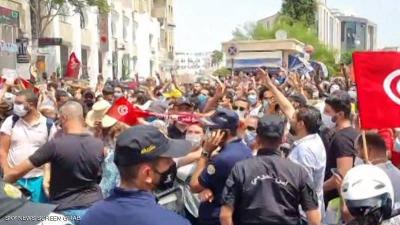A number of Tunisians demonstrated on Sunday around the Tunisian parliament, protesting the deteriorating health, political, economic, and social conditions in the country, while calling for the overthrow of the ruling system and accountability for the government and Ghannouchi. The angry protests spread beyond the Tunisian capital to several cities and provinces, witnessing a large public turnout, starting from Bardo Square, where the parliament is located, and extending to areas outside the capital.
Protests erupted in the coastal province of Sousse, Sfax (South), and Kef (Northwest) with the same slogans accusing Ennahda of occupying the country on the 64th anniversary of the Republic Day. Protesters chanted, "Oh Ghannouchi, Oh butcher, Oh killer of souls," and "The streets and confrontation until the regime falls," while accusing Ennahda's policies of robbing the dreams of youth, which has a 20% unemployment rate, according to the latest statistics from the Tunisian National Institute of Statistics.
Protesters are demanding the formation of a new government alongside the overthrow of the ruling class. Activists shared images and videos on social media showing protesters storming an Ennahda office in Touzer, southern Tunisia, where they emptied its contents and set fire to it. A number of protesters attempted to storm the Ennahda office in Kairouan, chanting slogans against the party and its leader, before being prevented by security forces.
The protests come amid an unprecedented health crisis due to the spread of the coronavirus, with a significant portion of Tunisians accusing the government of failing to manage this crisis. The ministry announced 5,624 new COVID-19 cases, raising concerns about the country's ability to combat the pandemic. The North African state recorded a record daily increase in deaths related to the coronavirus, with the Ministry of Health reporting 317 deaths in the last 24 hours related to COVID-19.
The country is experiencing popular anger due to Ennahda's policies which have undermined the democratic process and violently repressed opponents, as well as revealed attempts to exploit the judiciary to corrupt legal cases in several significant terrorism cases, including the murders of Shokri Belaid and Mohamed Brahmi.
Tunisian political analyst Belhassen Yahiaoui commented on the demonstrations, stating that Ennahda is currently "surrounded by crises, especially after being obstructed by exploiting the media and manipulating judicial files, particularly those closely linked to Ennahda leaders, which affects its judicial and media arms, alongside many criticisms directed at the movement at both regional and international levels."
Yahiaoui stressed the need for all opposition groups to unify around a set of goals and work to achieve them through protests. He believes that the core issue with Ennahda lies in loyalty, as it operates in favor of the global Muslim Brotherhood agenda rather than a national agenda, neglecting the concept of the state and national values. Thus, when it reached political decision-making in Tunisia following the elections of 2011, it did not introduce any new ideas to Tunisian politics and failed to succeed in managing the state.
He explained that "Ennahda lacks the tools required to govern or form a government, which demands an understanding of various data, alongside the absence of the concept of the state, whose priorities are entirely different from this international organization that does not believe in the homeland and only pursues its own interests."
In statements made on Friday, President Kais Saied accused internal parties of manipulating files to undermine the state, confirming the existence of lobbies within the state. He remarked in response to the deteriorating health situation coinciding with the spread of COVID-19 that "a critical reading of what has been done in recent months is necessary, and why Tunisia has deteriorated to this situation."




